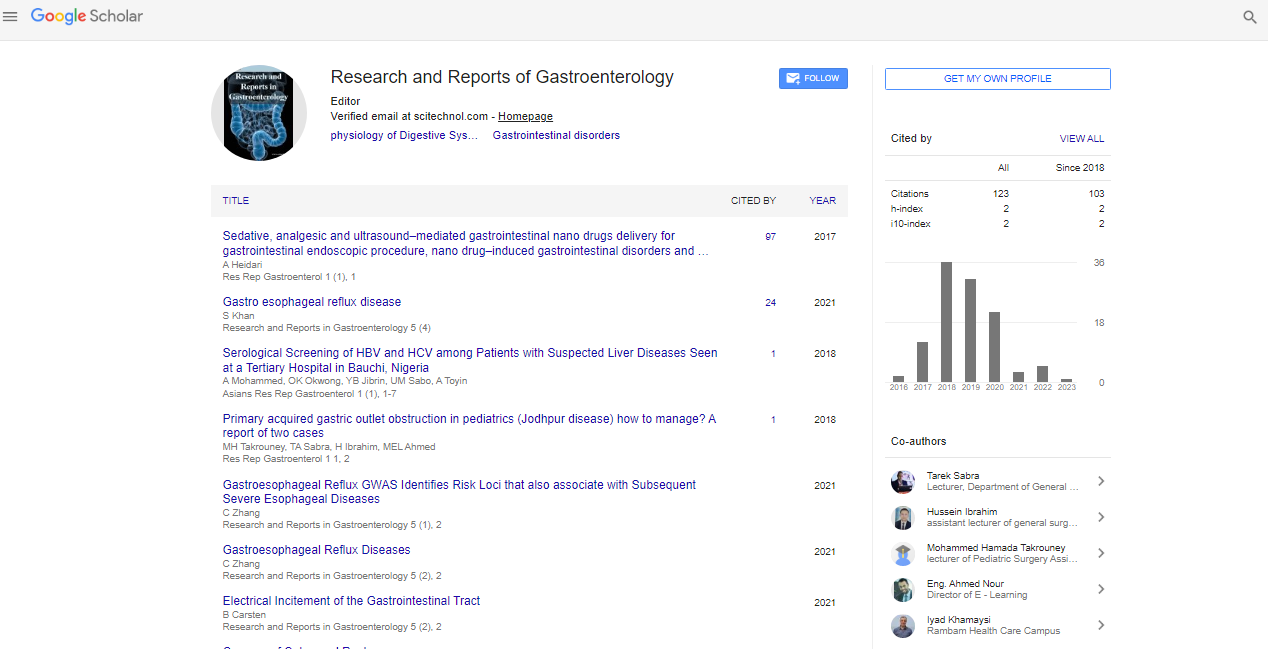Short Communication, Res Rep Gastroenterol Vol: 7 Issue: 1
Ulcerative Colitis and Crohn Disease
Malika Qureshi*
Department of Genetics, Pakistan Jordan Medical College, Peshawar, Pakistan
*Corresponding Author: Malika Qureshi
Department of Genetics, Pakistan Jordan Medical College, Peshawar, Pakistan
E-mail: qureshi_m5@gmail.com
Received date: 20 February, 2023, Manuscript No. RRG-23-97825;
Editor assigned date: 22 February, 2023, PreQC No. RRG-23-97825 (PQ);
Reviewed date: 08 March, 2023, QC No. RRG-23-97825;
Revised date: 15 March, 2023, Manuscript No. RRG-23-97825 (R);
Published date: 23 March, 2023, DOI: 10.4172/Rrg.1000136
Citation: Qureshi M (2023) Ulcerative Colitis and Crohn Disease. Res Rep Gastroenterol 7:1.
Description
Ulcerative colitis and Crohn's disease are two types of inflammatory bowel disease (IBD) that affect the digestive tract. While they share some similarities, they also have important differences in terms of symptoms, causes, and treatment options [1].
Ulcerative colitis is a chronic condition that affects the large intestine (colon) and the rectum. It causes inflammation and ulcers in the lining of the colon, which can lead to symptoms such as abdominal pain, diarrhea, and rectal bleeding. The exact cause of ulcerative colitis is unknown, but it is thought to be related to an overactive immune system that mistakenly attacks the lining of the colon [2].
Crohn's disease, on the other hand, can affect any part of the digestive tract, from the mouth to the anus. It causes inflammation and damage to the lining of the affected area, which can lead to a range of symptoms, including abdominal pain, diarrhea, and fatigue [3]. Crohn's disease can also cause complications such as fistulas, strictures, and abscesses. The exact cause of Crohn's disease is also unknown, but it is thought to be related to a combination of genetic, environmental, and immune system factors.
Diagnosis of both ulcerative colitis and Crohn's disease usually involves a combination of medical history, physical examination, blood tests, and imaging tests such as colonoscopy or endoscopy. In some cases, a biopsy may be taken to confirm the diagnosis.
Treatment for both ulcerative colitis and Crohn's disease aims to reduce inflammation, relieve symptoms, and prevent complications. This can involve a combination of medication, lifestyle changes, and surgery in severe cases [4].
Medications commonly used to treat both conditions include aminosalicylates, corticosteroids, immunomodulators, and biologics. Aminosalicylates and corticosteroids work to reduce inflammation in the digestive tract, while immunomodulators and biologics target the immune system to help prevent further damage. Lifestyle changes such as avoiding trigger foods, staying hydrated, and getting regular exercise can also help manage symptoms and improve overall health.
In severe cases, surgery may be necessary to remove damaged or diseased portions of the digestive tract. Surgery is usually a last resort after other treatment options have been exhausted, and it may involve the creation of a temporary or permanent ostomy [5].
Living with ulcerative colitis or Crohn's disease can be challenging, but there are resources and support available to help manage the condition. Support groups, online communities, and counseling can provide emotional support and practical advice for coping with the physical and emotional aspects of IBD.
It is important for individuals with ulcerative colitis or Crohn's disease to work closely with their healthcare provider to develop a personalized treatment plan that addresses their unique needs and symptoms. Regular check-ups, monitoring of symptoms and adjustments to treatment as need can help improve outcomes and prevent complications.
In summary, ulcerative colitis and Crohn's disease are two types of inflammatory bowel disease that affect the digestive tract. While they share some similarities, they also have important differences in terms of symptoms, causes, and treatment options. Both conditions can cause a range of symptoms and complications, but with proper diagnosis and treatment, most people with IBD are able to manage their condition and lead full, healthy lives.
References
- Sulz MC, Burri E, Michetti P, Rogler G, Biroulet L, Seibold F (2020) Treatment algorithms for Crohn’s disease. Digestion 101(1): 43-57. [Crossref][GoogleScholar][Pubmed]
- Brown S, Baker K (2012) Ulcerative colitis from patients' viewpoint: A review of two internet surveys. Gastroenterol Nurs 35(1): 54-63. [Crossref][GoogleScholar][Pubmed]
- Robinson CA (1993) Managing life with a chronic condition: The story of normalization. Qual Health Res 3(1): 6-28. [Crossref][GoogleScholar][Pubmed]
- Suris JC, Michaud PA, Viner R (2004) The adolescent with a chronic condition. Part I: Developmental issues. Arch Dis Child 89(10): 938-942. [Crossref][GoogleScholar][Pubmed]
- Torres J, Mehandru S, Colombel JF, Biroulet L (2017) Crohn's disease. Lancet 389: 1741-1755. [Crossref][GoogleScholar][Pubmed]
 Spanish
Spanish  Chinese
Chinese  Russian
Russian  German
German  French
French  Japanese
Japanese  Portuguese
Portuguese  Hindi
Hindi 